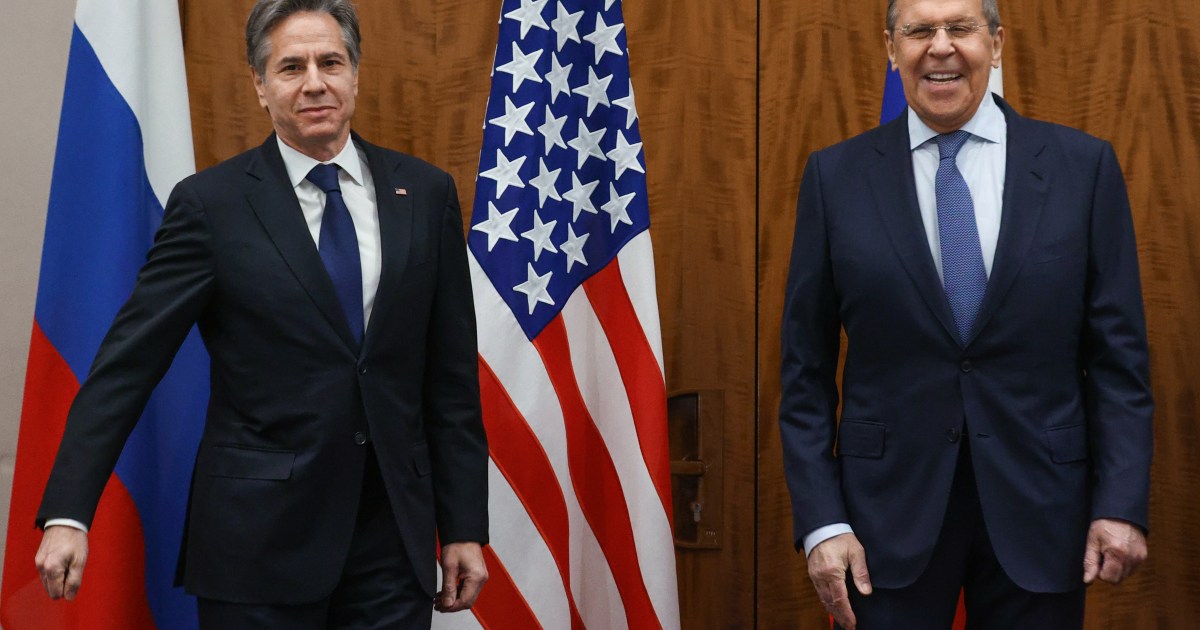Russian Foreign Minister Sergei Lavrov said he agreed with his American counterpart Anthony Blinken that Washington would provide answers next week on all of Moscow’s proposals, while Blinken stressed that his country is committed to resolving differences diplomatically, but will respond to any hostile act of Russia against Ukraine.
The two sides – after their meeting today, Friday in the Swiss city of Geneva – ruled out progress in their talks on Ukraine.
Al-Jazeera correspondent reported that the meeting of US Secretary of State Anthony Blinken and his Russian counterpart, Sergey Lavrov, ended ahead of schedule, as it was supposed to extend for about two hours.
After the meeting ended, Russian Foreign Minister Sergei Lavrov said that they agreed that Washington would provide written answers next week on all of Moscow’s proposals.
Lavrov added that Moscow’s approach is linked to the need to put an end to the expansion of NATO, noting that his country has repeatedly stressed that it has no intention of attacking Ukraine.
He stressed that Russia is awaiting an American response to its demands next week, saying that he only listened to Washington’s concerns.
He stressed that European security should not be linked only to the issue of Ukraine, adding that he had concerns about the West arming Kiev.
At the beginning of the meeting, Lavrov said that his country was waiting for concrete answers from Washington to its security demands, stressing that he did not expect a breakthrough in the talks with his American counterpart.
American warning
For his part, US Secretary of State Anthony Blinken said that his country is committed to resolving differences diplomatically, but it is committed to a decisive and strict response in the event of failure in this path, indicating that he does not expect any of the differences to be resolved today.
Blinken stressed that the talks with Lavrov were frank and substantial, noting that his country would respond in writing to Moscow regarding its demands next week.
“Russia has to choose between a diplomatic path or a hostile path that will have consequences,” he said, adding that Washington is ready to respond to Russia’s concerns on the condition that Russia responds to our concerns.
US President Joe Biden had pre-empted the talks by saying that Moscow would pay a heavy price if Russian forces crossed the Ukrainian border.
Top diplomats in the United States and Russia played down the prospect of resolving differences over Ukraine in talks between the two countries on Friday, but Washington hoped to reduce tension over the buildup of Russian forces that has fueled fears of a new conflict.
Russia has massed tens of thousands of its troops on its border with Ukraine, sent troops to Belarus to participate in military exercises, and wants NATO to pledge never to accept Ukraine as a member.
Western countries fear that Moscow is planning a new attack on a country it invaded in 2014 to annex Crimea.
Russia denies it is planning any attack, but says it may take unspecified military action if its list of security demands is not met.
Romania’s wrath
In a related context, Romania considered it “unacceptable” for Russia to request the withdrawal of NATO forces on Romanian soil, as part of an agreement that Moscow demands to conclude in order to de-escalate the Ukrainian crisis.
The Romanian Ministry of Foreign Affairs said – in a statement – that such a request is unacceptable and cannot be part of the negotiation topics.
On Friday, Russia demanded the withdrawal of North Atlantic forces from Romania and Bulgaria, two of its member states, as part of a treaty it demands to reduce the escalation of the Ukraine crisis.
“There is no ambiguity,” the Russian Foreign Ministry wrote in response to a question raised by a media outlet, adding that the issue is “the withdrawal of foreign forces, equipment and weapons, in addition to (taking) other measures with the aim of returning to the situation that existed in 1997 in countries that were not then members of the Atlantic Alliance.
“It is the case of Romania and Bulgaria,” the ministry said, but there are many other countries also involved in Central and Eastern Europe, such as Poland and the Baltic states.
British warning
Britain today warned Putin and his Chinese counterpart Xi Jinping that the West will stand together “in defense of democracy against dictatorship”, which it believes is “more blatant than at any time since the Cold War.”
British Prime Minister Boris Johnson said: “If Russia launches any attack on Ukraine, no matter how large, it will be disastrous, not only for Russia but for the world as well.”
This came in response to a question about the Russian-Ukrainian tension yesterday, while he renewed his country’s support for Ukraine’s sovereignty and territorial integrity.
Relations between Kiev and Moscow have been strained for nearly 7 years, against the backdrop of Russia’s illegal annexation of the Ukrainian Crimea and its support for separatists loyal to it in the Donbass.
Recently, Western countries accused Russia of massing its forces near the Ukrainian border, while Washington threatened to impose sanctions on Russia if it “launched an attack” on Ukraine.
De-escalation
British Foreign Secretary Liz Truss today called on Russia to “de-escalate” and hold “constructive talks” on Ukraine, warning that an invasion of that country would lead to a “terrible quagmire”.
During a visit to Sydney with Defense Secretary Ben Wallace, Truss said, “We and our allies will continue to support Ukraine, urge Russia to de-escalate and engage in constructive discussions.”
“The Kremlin did not draw lessons from history,” she added, stressing that the invasion would only lead to a terrible quagmire and loss of life, as happened in Afghanistan during the days of the Soviet invasion and the conflict in Chechnya.
More broadly, the trusts of Western democracies have called for working closely with Australia and other allies in the Indo-Pacific to “confront global aggressors” who have “become emboldened to a degree not seen since the Cold War”.
Australian Defense Minister Peter Dutten called on the “free world” to “stand firm”, and told the channel “Seven Network” today, “When we see Russia behaving the way it does, it encourages other tyrants and other dictatorships to do the same, especially if there is no response. did from the rest of the world.”
“Thousands will die, and this is something no one wants to happen,” he added, stressing that “the increase in Russian forces is very worrying.”
Russian invitations
On the other hand, the Russian Defense Ministry said that Minister Sergei Shoigu proposed to his British counterpart Ben Wallace to hold talks in Moscow.
At the same time, the TASS news agency quoted the Kremlin as saying that Russian President Vladimir Putin stressed that Kiev is still stubbornly refusing to fulfill its obligations under the Minsk agreements.
On the ground, the Russian Defense Ministry said that it has sent two battalions of the S-400 air defense systems to Belarus to participate in joint exercises between the two countries on the 10th of next month.
The ministry indicated that the two battalions will participate in the launch tests during the upcoming exercises, within what is known as the Rapid Response Forces of the State of the Union, which are joint forces between the two countries.





